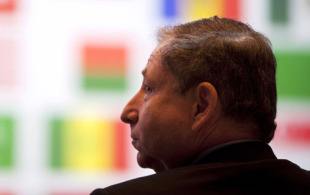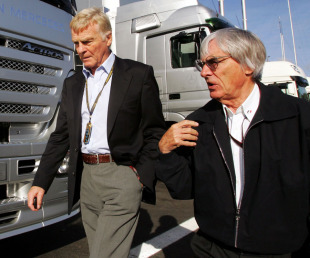- Formula Money
F1's governor

This year's Bahrain Grand Prix threw the FIA into the spotlight. For the past year there were question marks about whether the beleaguered race would take place but one week before it did, the FIA cleared up the confusion in a press release which gave its consent to the event. The FIA's own statutes prevent it from getting involved with any political action so, given the Bahraini government's overwhelming support of its GP, many people expected that the federation would put the brakes on the race. Its support of the event was an unpopular decision which made many people in F1 wonder what the FIA actually does. Here is the answer.
Under its current president, former Ferrari team principal Jean Todt, the FIA has gained a reputation for staying below the radar but things used to be very different. Todt's predecessor, Max Mosley was renowned for speaking out about the state of the sport from its regulations to its finances and the soaring spending levels of the teams. Indeed, after 18 years in the role, Mosley opted not to seek re-election in 2009 following a long dispute with the teams over his desire to introduce a £40m budget cap. The teams threatened to start a rival series to F1 if the cap was introduced and it was only after Mosley left that they dropped their bargaining chip and signed up to stay.
Prior to that, Mosley was famously behind the life-time bans handed to former Renault F1 team principal Flavio Briatore and his technical director Pat Symonds over their roles in rigging the result of the 2008 Singapore GP. Mosley was also in charge when McLaren was fined $100m in 2007 for being in possession of confidential Ferrari blueprints. He also strictly stood by the FIA's statutes including the commitment to refrain from "manifesting racial, political or religious discrimination in the course of its activities and from taking any action in this respect."
The last time adherence to this statute led to a decision which affected an F1 race was in 2006 when the Turkish GP promoter decided to put Cypriot leader Mehmet Ali Talat on the podium, billed as "the President of the Turkish Republic of Northern Cyprus", a non-existent state that is recognised only by Turkey. The result was that the promoter was fined $5m by the FIA and the following year F1's commercial rights holder, the F1 Group, took over management of the race. The Turkish government was lucky given that the Spanish city Jerez has not hosted a race since 1997 when the FIA, again under Mosley, disapproved of its mayor presenting a trophy on the podium simply because this hadn't been planned.
Mosley also spearheaded a vast number of safety initiatives and technical developments in F1 including the introduction of the KERS system which uses energy created under braking to give an additional boost on acceleration. He was renowned for pushing through changes to F1 despite resistance and this made his departure after the teams' threat all the more unexpected.
In contrast, in just two and a half years not only has Todt kept a low profile and allowed the Bahrain GP to take place, but, under him, the FIA has already had to back down on a battle over technical regulations. In June last year, following opposition from the circuits, the FIA had to revise its plans to introduce environmentally friendly 1.6 litre four cylinder engines in 2014. The circuits threatened to drop F1 and argued that the sound of the new engines would be so different to the current cars that it would drive fans away from the sport. Their threat led to the specification of the engines being increased to a six cylinder single turbo engine and it put the FIA on the back foot.
However, although the leadership style of Todt and Mosley is very different, the function of the FIA has not changed at all. It is F1's ultimate gatekeeper.
The FIA was established in 1904, 46 years before the first championship F1 race was held and around the time that the world's first motor races were taking place. Given that road cars had only gone into production at the end of the 1800s there was a need for an organisation to govern not only motorsport but also the emerging motoring industry and hence the FIA was born.
Having these two remits makes the FIA unlike most other sports governing bodies. The federation represents 227 national motorsport and motoring organisations from 132 countries including the world's biggest group, the American Automobile Association (AAA). This alone has over 50m members and, in total, FIA clubs represent well over 100m motorists and their families.
The federation has used its position to wield considerable influence on consumers and car manufacturers alike by developing initiatives such as the Euro NCAP rating system which has become the de facto standard for judging the safety of road cars.

Any general problems of FIA policy are dealt with by its senate which comprises a team of 10 members drawn from the federation's clubs and management. They include Todt and Mosley as well as Nick Craw who is the senate's president and is also chief executive of ACCUS, the sporting counterpart to AAA, which sanctions all motor racing in the US. Sporting matters are resolved by the World Motor Sport Council, a 26-man board who all come from within the sport and are presided over by Todt. The external experts who handle disputes at the FIA work for its International Court of Appeal (ICA) which hears challenges to World Council decisions.
All the FIA members normally meet once a year at a General Assembly and the cost for entertaining hundreds of members comes to around $150,000. Decisions are made there on overarching matters for motorsport or the federation such as approving the F1 calendar. Since the FIA is a non-profit making organisation it needs to show a revenue for every cost but it doesn't need to file accounts.
However, F1's industry monitor Formula Money estimates that for a sport which has billions of dollars poured into it, the FIA gets by on relatively modest revenues.
The FIA has two branches - FIA France and FIA Switzerland with the former receiving revenues from sporting activities and the latter carrying the majority of the federation's personnel costs. According to Formula Money, the FIA's total operating income comes to around $65m with expenses matching this. One of its biggest costs is the combined total of approximately $25m spent on personnel, travel and entertainment. Surprisingly this doesn't even include a salary for Todt since his is an unpaid position.
The FIA's revenue generally comes from member club subscriptions, registration and entry fees for racing series and annual fees from motorsport commercial rights holders. F1 provides a trifling amount of this.
The commercial rights to F1 only bring the FIA around $10m annually due to a deal Mosley did with F1's boss Bernie Ecclestone in 1995. The rights are ultimately owned by the FIA but prior to 1995 the federation handed them to the teams and received a 30% share. Ecclestone negotiated the sale of the rights on behalf of the teams but the deal done with the FIA saw the rights handed directly to his company Formula One Management (FOM) until 2010.
The teams were furious and accused Ecclestone of stealing the rights from them. It is still a sore point with McLaren chairman Ron Dennis who in 2010 told Ecclestone's biographer Susan Watkins, "Bernie effectively stole Formula One from us...some people would say it was brilliant, but in essence it was pretty deceitful because the teams were trying to say 'hold on Bernie we own these rights.'" It's no surprise the teams were annoyed.
The F1 Group, which owns FOM, has turnover of $1.6bn which is 160 million times more than the fee paid to the FIA. The explanation for the low charge was that Ecclestone needed all the money he could get to fund F1's pay-TV drive and the governing body would reap the benefits when the rights returned to it in 2010.
Things didn't quite go to plan as although Ecclestone spent an estimated $70m on developing a pay-TV operation, the market crashed leaving him with a very good rights deal.
The FIA received a bigger windfall in 2001 when, following an anti-competition investigation by the European Commission (EC), it agreed to sell the rights to F1 for 100 years, and the F1 Group paid $313.7m for the privilege. The payment didn't hit the FIA's own coffers but instead funded the FIA Foundation, which makes grants to motoring and motorsport safety and research programmes.
F1 also brings around $5.5m to the FIA from registration and entry fees as well as the cost of drivers' super licenses. This put the FIA's total take from the sport at around $15.5m. In contrast, the commercial rights fees and registration income from World Rally as well as all other series, such as GT3 and World Touring Car, came to around $22.5m.
Despite its low take from F1, most of the FIA's sporting activities involve it - from the lowest level, where the governing body allocates media accreditation to journalists, to the highest level where it writes the F1 regulations.

The only other time that the FIA could decide on who controls the rights to the sport is if there is a change of control of the F1 Group. When its current owner, the private equity firm CVC, bought the business in 2006 the FIA had to give its approval and it will have to do so again if a majority stake is sold in it. This is because the FIA owns a crucial share in an F1 Group company called Formula One Asset Management and this stops the sport falling into the hands of an owner that the FIA does not approve of. However, there are catches to this as, for example, the upcoming flotation of the F1 Group will not need clearance from the FIA since only 20% to 30% of the business is due to be listed on the stock market which does not constitute a change of control.
The FIA's decisions aren't always liked by F1's participants and the media but that is inevitable given its position of power over many competing interests. The irony is that while the FIA's ultimate power is perhaps its biggest strength it also makes it an easy target for criticism. Unless Todt speaks up more that is likely to grow.

